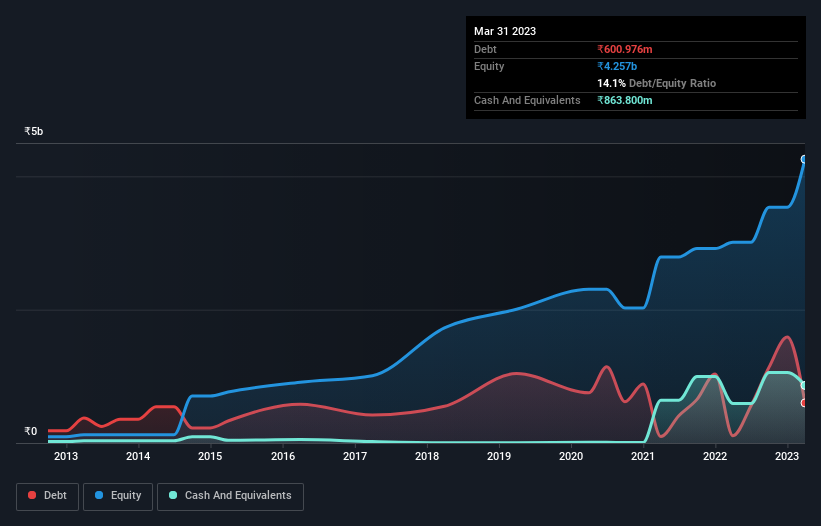Safari Industries (India) (NSE:SAFARI) Has A Pretty Healthy Balance Sheet

Some say volatility, rather than debt, is the best way to think about risk as an investor, but Warren Buffett famously said that 'Volatility is far from synonymous with risk.' So it seems the smart money knows that debt - which is usually involved in bankruptcies - is a very important factor, when you assess how risky a company is. We note that Safari Industries (India) Limited (NSE:SAFARI) does have debt on its balance sheet. But the more important question is: how much risk is that debt creating?
What Risk Does Debt Bring?
Debt and other liabilities become risky for a business when it cannot easily fulfill those obligations, either with free cash flow or by raising capital at an attractive price. Part and parcel of capitalism is the process of 'creative destruction' where failed businesses are mercilessly liquidated by their bankers. While that is not too common, we often do see indebted companies permanently diluting shareholders because lenders force them to raise capital at a distressed price. Of course, plenty of companies use debt to fund growth, without any negative consequences. The first thing to do when considering how much debt a business uses is to look at its cash and debt together.
Check out our latest analysis for Safari Industries (India)
What Is Safari Industries (India)'s Debt?
As you can see below, at the end of March 2023, Safari Industries (India) had ₹601.0m of debt, up from ₹110.2m a year ago. Click the image for more detail. However, it does have ₹863.8m in cash offsetting this, leading to net cash of ₹262.8m.

How Healthy Is Safari Industries (India)'s Balance Sheet?
We can see from the most recent balance sheet that Safari Industries (India) had liabilities of ₹2.44b falling due within a year, and liabilities of ₹785.3m due beyond that. Offsetting these obligations, it had cash of ₹863.8m as well as receivables valued at ₹1.88b due within 12 months. So its liabilities total ₹482.2m more than the combination of its cash and short-term receivables.
Having regard to Safari Industries (India)'s size, it seems that its liquid assets are well balanced with its total liabilities. So it's very unlikely that the ₹68.1b company is short on cash, but still worth keeping an eye on the balance sheet. While it does have liabilities worth noting, Safari Industries (India) also has more cash than debt, so we're pretty confident it can manage its debt safely.
Better yet, Safari Industries (India) grew its EBIT by 351% last year, which is an impressive improvement. That boost will make it even easier to pay down debt going forward. The balance sheet is clearly the area to focus on when you are analysing debt. But it is future earnings, more than anything, that will determine Safari Industries (India)'s ability to maintain a healthy balance sheet going forward. So if you want to see what the professionals think, you might find this free report on analyst profit forecasts to be interesting.
Finally, a business needs free cash flow to pay off debt; accounting profits just don't cut it. Safari Industries (India) may have net cash on the balance sheet, but it is still interesting to look at how well the business converts its earnings before interest and tax (EBIT) to free cash flow, because that will influence both its need for, and its capacity to manage debt. Considering the last two years, Safari Industries (India) actually recorded a cash outflow, overall. Debt is far more risky for companies with unreliable free cash flow, so shareholders should be hoping that the past expenditure will produce free cash flow in the future.
Summing Up
While it is always sensible to look at a company's total liabilities, it is very reassuring that Safari Industries (India) has ₹262.8m in net cash. And it impressed us with its EBIT growth of 351% over the last year. So we are not troubled with Safari Industries (India)'s debt use. When analysing debt levels, the balance sheet is the obvious place to start. However, not all investment risk resides within the balance sheet - far from it. For instance, we've identified 3 warning signs for Safari Industries (India) (1 is a bit concerning) you should be aware of.
When all is said and done, sometimes its easier to focus on companies that don't even need debt. Readers can access a list of growth stocks with zero net debt 100% free, right now.
New: Manage All Your Stock Portfolios in One Place
We've created the ultimate portfolio companion for stock investors, and it's free.
• Connect an unlimited number of Portfolios and see your total in one currency
• Be alerted to new Warning Signs or Risks via email or mobile
• Track the Fair Value of your stocks
Have feedback on this article? Concerned about the content? Get in touch with us directly. Alternatively, email editorial-team (at) simplywallst.com.
This article by Simply Wall St is general in nature. We provide commentary based on historical data and analyst forecasts only using an unbiased methodology and our articles are not intended to be financial advice. It does not constitute a recommendation to buy or sell any stock, and does not take account of your objectives, or your financial situation. We aim to bring you long-term focused analysis driven by fundamental data. Note that our analysis may not factor in the latest price-sensitive company announcements or qualitative material. Simply Wall St has no position in any stocks mentioned.
About NSEI:SAFARI
Safari Industries (India)
Manufactures and markets luggage and luggage accessories in India.
Flawless balance sheet with high growth potential.
Similar Companies
Market Insights
Community Narratives




